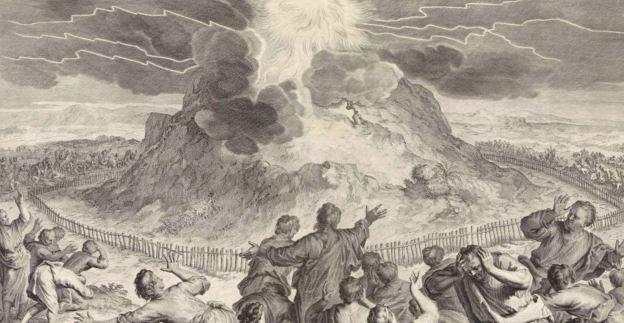Summary
When I was younger I had the opportunity to attend Government House to receive my Boys’ Brigade Queen’s Badge from the Governor-General. Because the Governor-General is the Queen’s representative in New Zealand, everybody who attended had to dress nicely, observe protocols (standing, showing respect for the office, etc), and behave appropriately!
God, the Israelites’ divine King, was coming to visit his people at Sinai. They needed to prepare themselves for his arrival, getting spiritually ready for that special day when God would descend and speak through Moses to them. While God appeared to Israel in the cloud, he has come to us in the person of Jesus, so we too can approach God, spiritually ready.
Our Passage Explained
V9-11
After the Israelites committed themselves to entering into a covenant relationship with God, where he would be their covenant king, Moses went to report this to God (v.8). But before he could do so, God told him he would authenticate Moses’ role as God’s appointed leader by appearing in “a thick cloud, that the people may hear when I speak with you, and may also believe you forever” (v.9).
In response to the people’s commitment, God instructs them to prepare for his arrival. They are to “consecrate them[selves] today and tomorrow, and … wash their garments and be ready for the third day” when he would appear (vv.10-11). They were to make themselves ready for God’s appearance. The outward washing of garments was symbolic of an inner cleansing, as they prepared spiritually.
v12-16
Moses was also to ensure the right protocols and behaviour. The Israelites were not to touch the mountain which would become holy through God’s presence, either by accident or a disrespectful desire for a closer meeting, which would lead to their death (vv.12-13). God is holy and cannot be approached sinfully or irreverently.
After these instructions are given to Moses, he relays them to the Israelites who ready themselves physically and spiritually for God’s arrival (v.14). They also abstained from intimate relations (v.15), as this made them ritually unclean to participate in the special occasion (Lev. 15 contains these rules as an ongoing part of their religious worship).
On the third day, God appeared to the Israelites in “cloud and majesty and awe” (as we sing in my favourite Christmas Carol; O Come, O Come, Emmanuel). God’s awesome holiness and majesty is declared as his presence was accompanied by “thunders and lightnings and a thick cloud on the mountain and a very loud trumpet blast” that left the people visibly shaking (v.16).
v17-25
Moses led the people to the edge of the mountain to meet God (v.17). Meanwhile, Creation itself struggles to react to its Creator’s presence, as God descends on it in fire (representing his purity and power) and smoke billows everywhere and noises grow louder (vv.18-19), before God finally rests on the top of the mountain to which he calls up Moses (v.20).
God tells Moses to remind Israel not to approach him, because in his holiness and their sinfulness there is a barrier of unapproachable holiness and majesty (v.21). Even those who had offered sacrifices to God must prepare themselves properly for entering God’s presence (v.22).
Despite Moses’ insistence that his earlier warnings were enough, God knows better and insists that Moses again descend the mountain and warn the people (vv.23-4). God’s holiness and majesty is important, and so too is respecting his commands and behaving reverently towards him. Moses obeyed God’s command (v.25), reminding the Israelites of how they should behave.
Our Passage Applied
When God descended to Sinai, the people saw him in majesty and awe. It taught them, as it teaches us, that God is holy, immortal, and dwells in unapproachable light (1 Timothy 6:16). Nobody can see God, and even Creation struggles to express his wonder and purity to us.
Because of God’s wonder and glory, our approach to worship of him must be respectful and reverent, and as he commands. God is holy and a consuming fire (Heb. 12:29), and we must worship him with respect.
But unlike the Israelites who trembled at the foot of the mountain, we can boldly come into God’s presence to worship and praise him because God descended again to dwell with his people, not in “cloud and majesty and awe” but as a tender baby boy, Jesus Christ (John 1:14).
Jesus’ life and atoning death on the Cross cleanses us from all sin and impurity, as we receive him by faith. Clothed in Christ’s righteousness, we can enter God’s presence to praise and commune with him. God’s Holy Spirit continues to spiritually cleanse our lives, making us what he has declared us, in Christ, to be – holy.
Therefore, we approach Mount Zion, the heavenly city, to worship God and enjoy his presence (Heb. 12:22-28). We approach a mountain which does not shake like Mount Sinai, and will not be shaken when God returns in majesty and awe at the Last Day. We are made spiritually ready, prepared for entering the presence of our Divine King.

